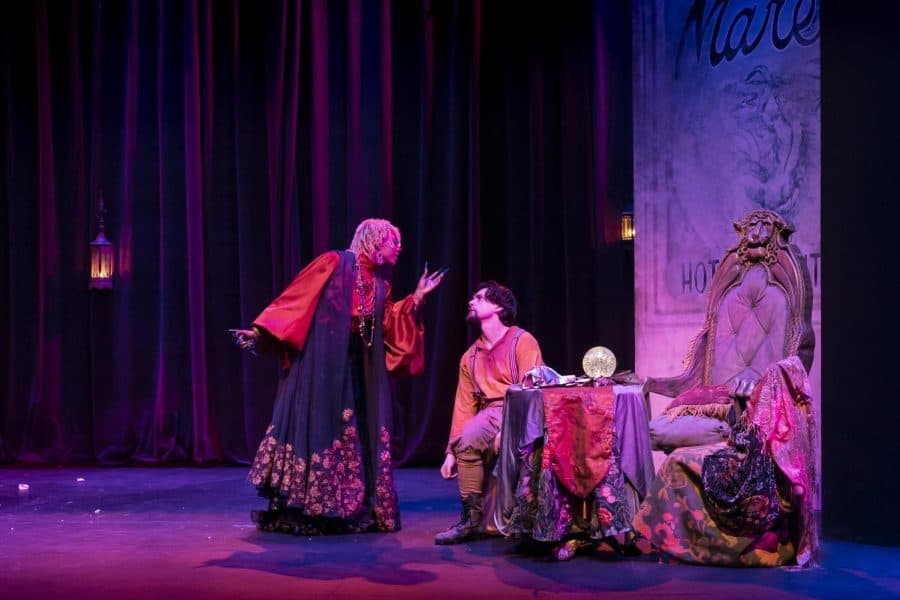“Ten Blocks on the Camino Real” emphasizes the significance of the ‘other’
February 15, 2023
The University of Alabama’s Theatre and Dance Department’s new show, “Ten Blocks on the Camino Real” opens on Feb. 15 and runs through Feb. 26. Directed by UA’s head of directing and stage management, Matt Davis, and with approximately 30 cast and crew members, “Ten Blocks on the Camino Real” had many minds that came together to analyze the script and pull off a successful production.
“Ten Blocks on the Camino Real” was written in 1952 by playwright Tennessee Williams, who is largely known for interlacing his works with LGBTQ themes and for having a broad spectrum of eccentric and somewhat unnerving characters. The play follows Kilroy, a visitor from America, and his interactions with those who populate the main plaza of the Camino Real, a fictional setting based on places around Mexico and California.
The show works to twist audience members’ perceptions of reality, daring them to immerse themselves in a universe where they are unsure of the rules and norms that the characters live by.
“Tennessee Williams definitely always worked with symbolism in a lot of his works. But this is probably one of his most expressionistic pieces. It lives in a place that’s almost close to absurdity,” Davis said. “The Camino Real is… we don’t know what it is. We don’t know if it’s in his mind, we don’t know if it’s purgatory, we don’t know if it’s just outside of [Los Angeles], it could be anywhere.”
You may see a few familiar faces within this show. Williams uses literary characters such as Esmerelda, Casanova and Lord Byron from “The Hunchback of Notre-Dame,” Don Quixote, Sancho and Marguerite Gautier from “The Lady of the Camellias,” and a variety of others. Though pulling inspiration from literature, Williams challenges who we assume these characters to be.
“Everybody has an idea of who these people are because they’ve been marked in history to represent something. Casanova was the lover. … Don Quixote was the idealist and represented all that was good in the world. But humanity’s the one that created that role for them through the years and over centuries,” Davis said. “So, what are their truths when you really strip away what we’ve placed on them? I think that that is kind of what they struggle with in the play, too, is getting down to their true self and not just what society, specifically American society, has put on them through the years through tropes.”
Kilroy’s interactions with these characters range from blatant robberies to a recurring loss of virginity from Esmerelda. Perhaps his most significant experiences, though, are with the street cleaners. In theory, they represent his subconscious, the ever-looming sense that his heart that’s “as big as the head of a baby” will give out, and he would have no one left to mourn him, forcing him to suffer post-mortem disrespect from the cleaners due to their general degradation of those who surround them.
“Ten Blocks on the Camino Real” is not meant to be simple. Tennessee Williams often wrote in metaphor, capitalizing on our easy usage of stereotypes and assumptions to craft a story that asks us to look beyond what has been told to us and instead see what’s being shown to us.
Andrew Hines, a junior majoring in computer engineering, plays a street cleaner in the show, and said he believes the show is a spectacle.
“I think that we’ve put together a piece of art that tells the story of what it is like to be ‘other’ in the words of our director, Matt,” Hines said. “I think that’s an important story to learn, especially in the age where a lot of controversy surrounds the treatment of people with different races and different sexual orientations. I think it’s a strong and important message and that we talk about in an artful manner.”
Though there were creative liberties taken, as directors often do, “Ten Blocks on the Camino Real” still works with difficult themes. Tennessee Williams dealt with hardship, depression and addiction throughout his life. His plays, while meant to bring about deep discussion, also mirror his mental state.
“Keep an open mind. There are a lot of heavy topics that come from the show. I think that based on the events that took place, most people are kind of closed minded on the basis of the show,” said Lauryn Green, a sophomore majoring in theatre, who plays the Oracle. “If you’re coming to see what we’ve put together, you have to keep an open mind and be mindful of everything that kind of displays itself within the show.”
“Ten Blocks on the Camino Real” is not only working to urge audience members to look inside themselves, but also the actors. To fully express the depth of the characters, the actors must ensure they understand all aspects of the role they play so they can convey it appropriately.
“Starting off, I kind of had to go in and dissect what I felt like I should depict it in the perfect way rather than coming off like a way of mocking,” Green said.
Davis said he believes this play is an exploration of true self and unkindness.
“It’s an exploration of the self-doubt that humans have and the unkindness that they bring to the world when they’re struggling with being their true self and not letting their true self out,” Davis said. “I’m excited to perform this in the Gallaway Theatre. I think it is a thinker’s piece. I hope that everybody afterwards heads to Waffle House or their neighborhood pub and has a chat for an hour or two about what they thought about the show and what it was about and what it meant to them. Because I think the more that we think about theatre, the better that we are and the more that we take in art.”
“Ten Blocks on the Camino Real” opened in the Marian Gallaway Theatre in Rowand-Johnson Hall, and tickets are currently available for $15. All shows are at 7:30 p.m. except for the matinee on Sunday, Feb. 26 at 2:00 p.m. For more information on upcoming shows within the Department of Theatre and Dance, visit here.




















